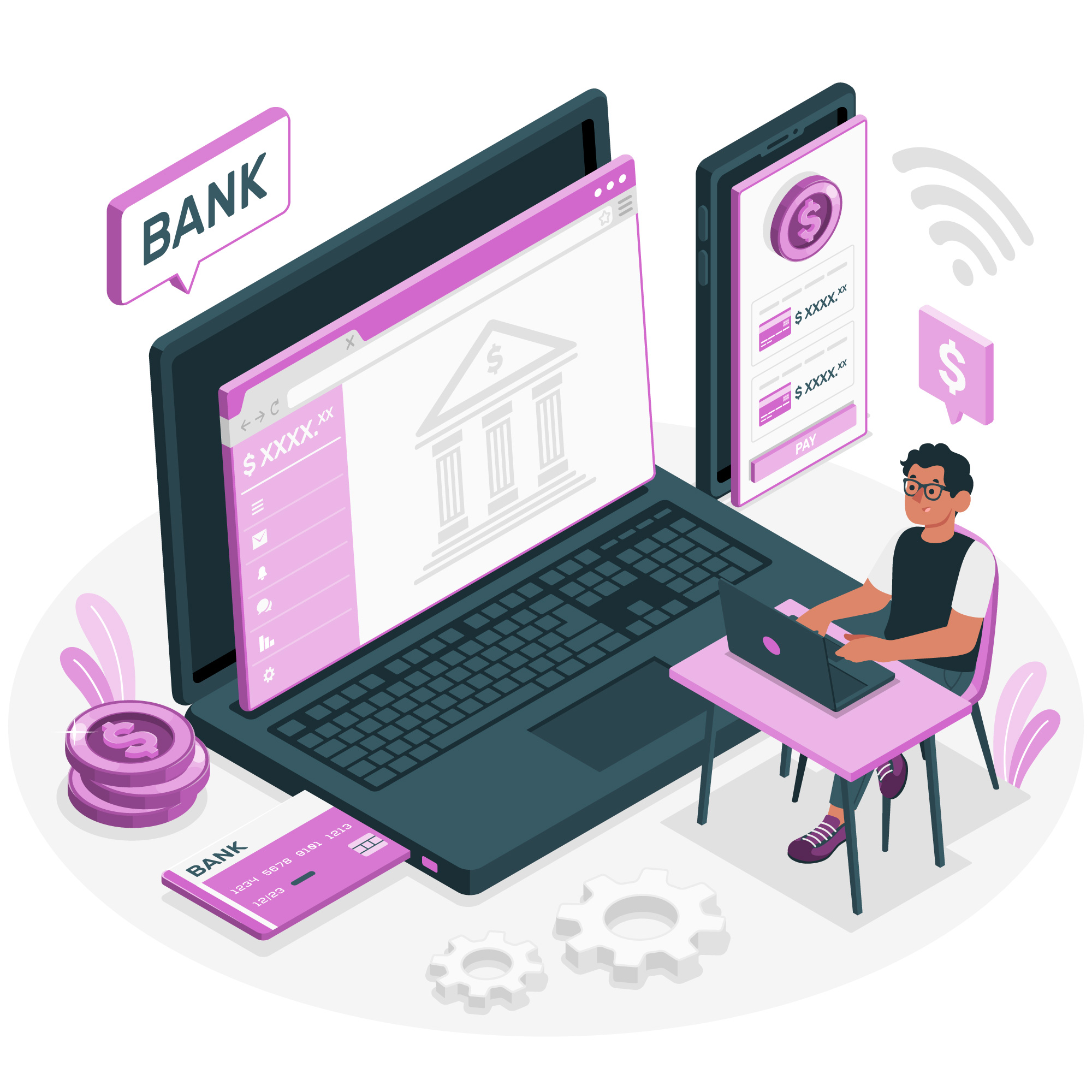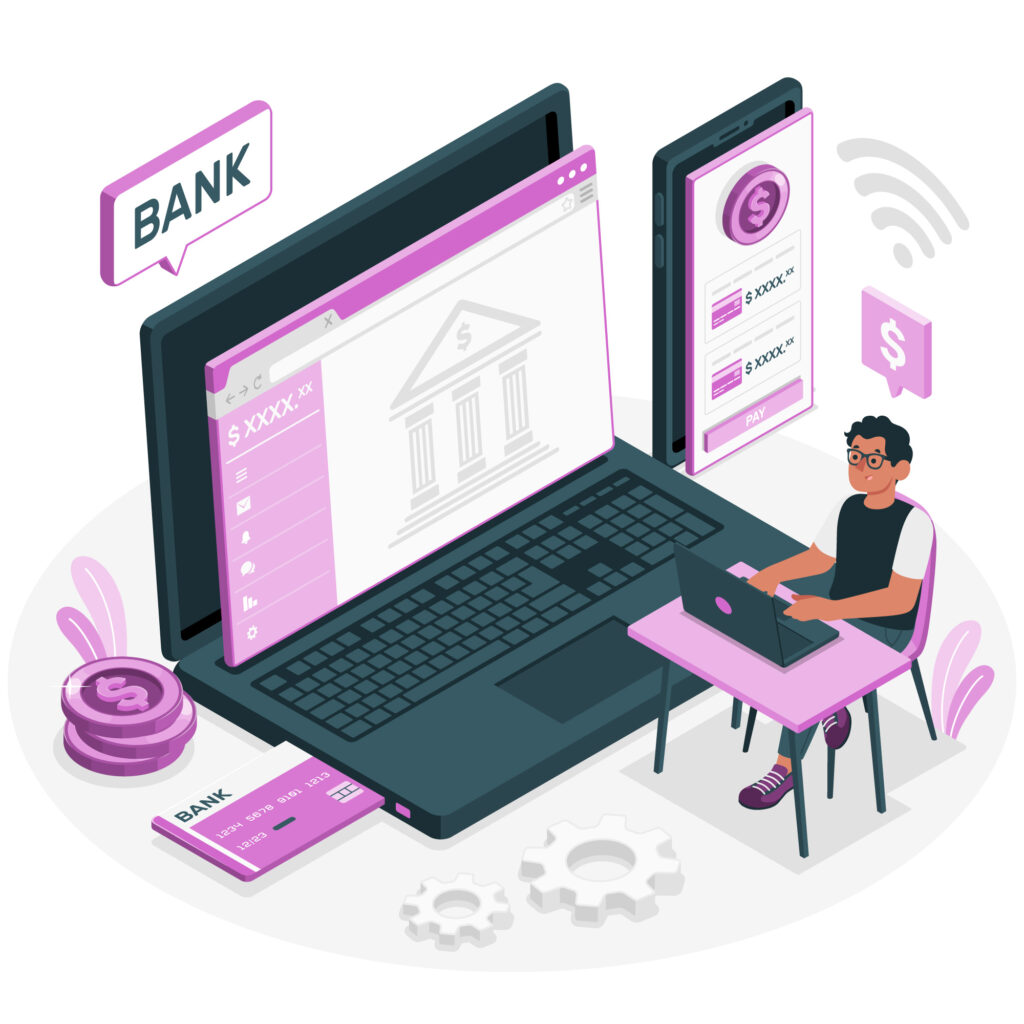
Online banking, also known as Internet banking, is a modern banking system provided by banks and other forms of financial institutions that allows clients to execute financial transactions and manage their finances remotely, that is, via the Internet. In other words, online banking eliminates the need for clients to actually visit a branch.
The origins of online banking go as far back into the past as the 1960s, when the first ATMs started to appear, but it started kicking off proper in the ‘80s and the ‘90s, once the Internet and personal computers had become a more widespread phenomenon.
How Online Banks Work
___________
How does an online bank work? Usually, clients can access an online bank through websites and apps. As digital security is one of the paramount concerns, these platforms typically require customers to log in using personalized, highly encrypted login credentials or biometrics (such as face identification or fingerprint scanning).
The exact range of online banking services available differ from bank to bank. Generally, most platforms support transfers and bill payments. Others may offer clients check ordering features, stop payments, etc.

What Can You Do With Online Banking
___________
Nowadays, online banking platforms provide users with a range of financial services that go beyond mere money transfers. By using a baking app, for example, clients can pay their bills, apply for loans, exchange currencies, deposit checks, etc.
Moreover, online banking platforms provide users with a plethora of financial management tools. They can analyze detailed transaction histories, set budgetary limits, and receive real-time notifications in regard to all relevant bank activities.
Note, though, that there are still some restrictions on mobile banking that seem to apply almost universally. For example, most banks will not allow clients to apply for mortgages online or purchase traveler’s checks.
Mobile Banking vs. Online Banking
___________
How is mobile banking different from online banking? In short, mobile banking is just a type of online banking with a special focus on providing clients with online financial services through mobile apps. Thus, mobile banking and online banking have a lot in common, but mobile banking is where true convenience lies, as clients can manage their finances using smartphones or tablets.
Benefits of Online Banking
___________
Online banking brings numerous advantages, such as:
- Convenience: Instead of having to visit a physical bank, you can access and manage your accounts yourself from the comfort of your home or from any other location where you have an Internet connection.
- 24/7 accessibility: Online banking has made it possible for clients to perform all sorts of banking activities at any time, even during holidays.
- Enhanced security: Nowadays, banks employ a variety of encryption technologies and release apps with multi-factor authentication processes to safeguard user data.
- Personalized financial data: By using online banking platforms, users can gain access to personalized financial reports that can help them manage their money more conveniently. That includes viewing transaction histories, managing expenses, etc.
- Integration with other apps: Many online banking platforms can be integrated with other finance management tools and apps, allowing for even quicker transactions.
How to Start an Online Bank
___________
Establishing an online bank can be extremely difficult.
Assuming they’ve covered the funding process, aspiring entrepreneurs must come up with a clear plan and know their target audience. This involves a lot of market research, especially regarding client sentiment and industry trends.
Once you’ve laid down your project, you’ll have to start thinking about internal administration. Who are you going to hire and why? How is the company going to run? Forming a firm is hard work, but with a strong team behind you, you’ll have an easier time finding a good office, coming up with a brand, etc.
Next, you must apply for licenses. This is the most difficult step, and you’ll often have to develop your business model at least somewhat before you can convince regulatory bodies such as The Office of the Comptroller of the Currency (OCC) that your project is worth considering.
Once you’ve got your company structure sorted and once you’ve got all relevant licenses, it’s time to market your bank. Naturally, you’ll focus on your target audience primarily, but branching out into other markets is never amiss.
How ReactivePay Can Help
Online banking is all about automation, so you’ll most likely be introducing a lot of software payment solutions to your business model to streamline development and attract potential clients.
These solutions are typically the work of companies specializing in payment processing, and they offer various features that can meet the needs of businesses and private individual clients alike. We recommend ReactivePay.
ReactivePay is an open-architecture payment engine built around the premise that simplicity, speed, and reliability are the three essential components of an online banking platform. ReactivePay offers a convenient API endpoint for all sorts of online banking applications.
By relying on the ReactivePay bank account API, you can easily incorporate a number of functionalities into your banking app, including:
- Opening bank accounts
- Customer acquisition process
- Know-your-customer (KYC) procedures
- Multi-currency bank account management
- Currency exchange rate service
- Front-end application framework
- Admin/Management back-office
- Etc.
FAQs about Online Banking
___________
Are online bank transfers instant?
Online bank transfers can be but are not always instant. The processing speed depends on a number of factors, such as cut-off times, whether you’re sending money internationally, what bank the recipient is involved with, etc.
How do online bank accounts work?
The process of setting up an online banking account will depend on the specific bank, but it usually involves downloading some kind of app and applying for online banking by using your credit card number and other credentials.
Are there any fees associated with online banking?
Most banks offer their online banking services for free, but some forms of transactions and activities might incur some costs, depending on the bank in question.